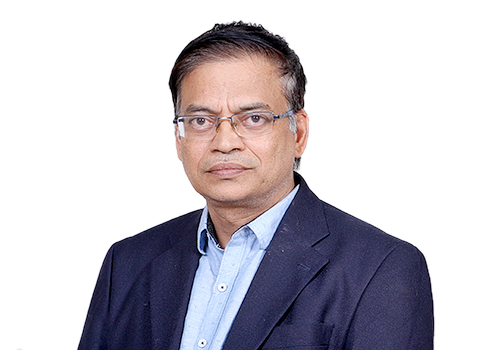- Home
- Faculty
- School of Advanced Engineering
- Energy
- Pankaj Kumar Srivastava

Professor Pankaj Kumar Srivastava
Professor
Profile Summary
Professor Pankaj Kumar Srivastava is recognized as one of the leading experts in space technology and earth resource modeling. His research focuses on subsurface resource modeling, satellite data processing, and data modeling. It involves the study of satellite data interpretation through machine learning algorithms, groundwater and hydrocarbon data modeling, land surface study of geological features, and subsurface study through geophysical data interpretation. He obtained his PhD degree from IIT Kharagpur and conducted further research at the University of Tokyo, Japan.
Work Experience
Prof. Srivastava joined UPES in 2010. Prior to joining UPES, he worked at the National Remote Sensing Centre, Hyderabad, as a research scientist, focusing on groundwater prospects mapping and quality analysis for the entire India through satellite data interpretation on a geospatial platform. He also worked at the University of Tokyo as a researcher on Hydrological modeling of the Mekong River and was a project scientist at IIT Kharagpur.
Research Interests
Professor Srivastava's research areas include hydrological and hydrogeological modeling, surface water-groundwater interaction study, avalanche prediction mapping, coastal bathymetry, satellite data processing through AI/ML algorithms, and geospatial technology for natural resource mapping. He also researches Nano catalysts based on biochar red mud and bentonite. He has published more than 50 papers in conferences, books, and reputed national and international journals (https://scholar.google.co.in/citations?user=TcPLjEgAAAAJ&hl=en ). His publications have received more than 800 citations, with an h-index of 12 and an i10-index of 15. He has successfully guided 5 doctoral students and is currently supervising many students for their PhD degrees.
Teaching Philosophy
Professor Srivastava strongly believes in interactive learning and a teaching philosophy that allows students to reach their full potential. He ensures a conducive environment in the class where students can share their ideas and take on challenges. He prefers to design course content that incorporates different learning styles, such as "flipping the classroom," and makes the content relevant to the student's lives. Students are provided with reading resources before class to enhance their understanding. Oral and written class quizzes are conducted during the class to assess their level of comprehension. His courses incorporate field-based learning, group learning, project-based learning, interdisciplinary assignments, and application-based work that engage and activate students' learning.
Courses Taught
Prof. Srivastava teaches various courses to UG and PG students from different disciplines. He teaches remote sensing and photogrammetry courses where students upgrade their skills to identify surface features and topography of Earth. Geospatial courses such as GIS and Spatial database help students in modeling Earth resources. In addition to remote sensing and GIS, he teaches the basics of Geology and statistical analysis of geological processes, enabling students to learn about the Earth and model geological processes. In another stream, he discusses the geophysical investigation of natural resources hidden within the Earth, such as groundwater, minerals, and hydrocarbons. Students apply geophysical knowledge to evaluate the prospects of subsurface resources.
Awards and Grants
Prof. Srivastava has undertaken a Consultancy project worth RS 4 lacs. He received an ISRO scholarship under Rajiv Gandhi National Drinking Water Mission for the study of groundwater prospects and its quality in various states of India. He received a GATE scholarship for studying M.Tech. and an Institute scholarship for PhD at IIT Kharagpur. He was also awarded the Monbukagakusho scholarship by the Government of Japan in the field of Remote Sensing for research at the University of Tokyo, Japan.
Scholarly Activities
Professor Srivastava is a life member of the Indian Society of Remote Sensing and a reviewer for various journals, such as the Journal of Ocean Engineering and Science and the Journal of Earth System Science. He is an active committee member in organizing symposia and conferences. He evaluates projects of UG and PG students and serves as a committee member for the evaluation of PhD programs for their progress. He also supervises several UG, PG, and PhD students.
Contact